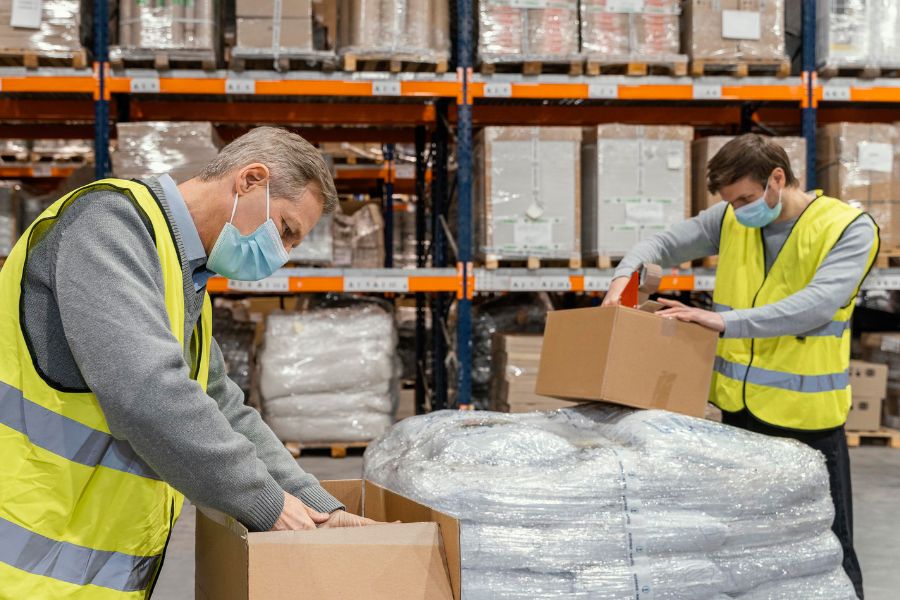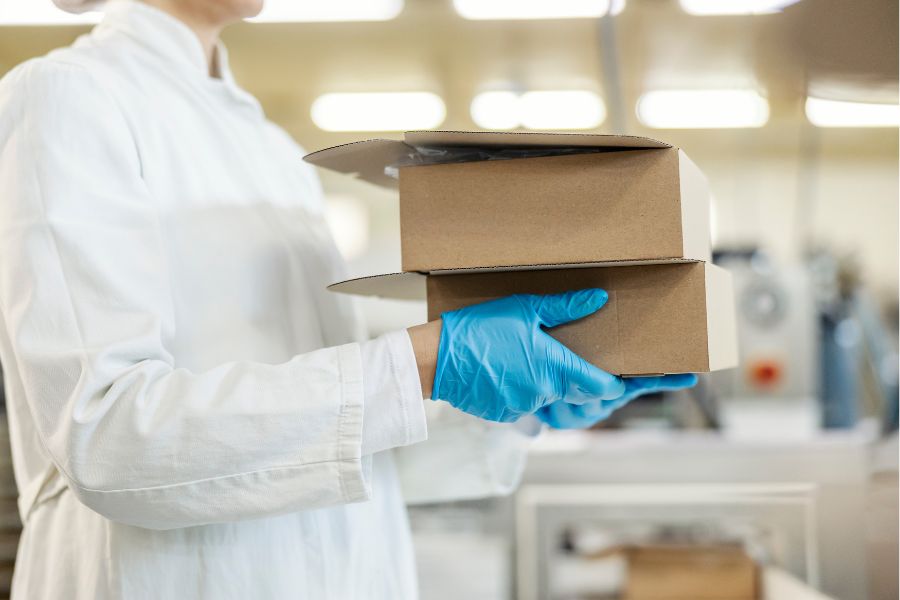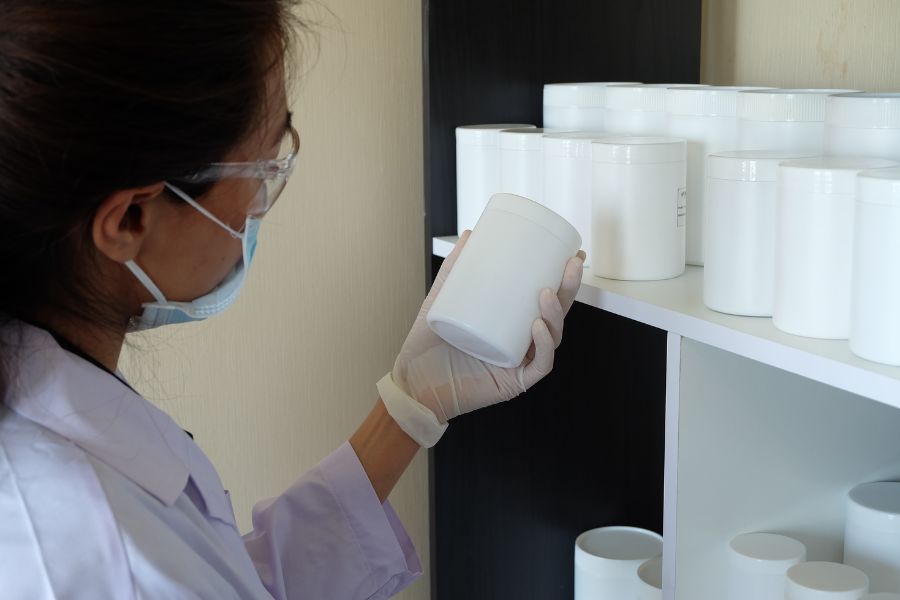How to Stay Ahead of Packaging Regulations
Regulations—the word alone can send some businesses spiraling. Keeping up with changing requirements for the varying aspects of your company’s operations can be a daunting task. However, there are benefits to maintaining compliance with regulatory codes and rules without needing to stress about every new update or change to your previous methods of operation.

The guidelines you are required to follow with packaging may change based on industry or products. Thankfully, no matter what type of products you package, there are still resources, strategies, and tools you can use to stay ahead of packaging regulations.
The Ever-Changing Landscape of Packaging Regulations
Packaging regulations are always changing. Part of working with manufacturing and products is needing ways to safely store, transport, and display those items. Priorities like sustainable packaging and reducing waste are often the driving forces behind new updates to packaging standards. Still, other factors like safety, size, and design are also impacted by packaging regulations.
Why Staying Ahead of Packaging Regulations Matters
Packaging compliance means staying ahead of changes before they become enforceable. Major changes to regulations often have a grace period, so businesses can make the necessary changes before a violation occurs. There are several reasons why this is important for businesses, especially ones that rely heavily on packaging for physical products.
Fines and Penalties from Regulatory Agencies
Regulations are not mere suggestions but mandatory requirements that businesses must adhere to for their product packaging. Failure to comply with the established packaging standards can result in various penalties, the most common being fines. However, depending on the severity of the violation, additional consequences may include product recalls, disruptions in production, or even bans from specific markets.
Product Recalls and Disruptions to the Supply Chain
As mentioned above, products that are packaged in materials or packaging that fail to live up to the set standards may be recalled. By establishing a quality control system, your business can detect product flaws before they reach customers, thereby reducing the risk of recalls and protecting your brand reputation. Similarly, a business that has been found guilty of a regulatory violation may be required to halt production until the issue is resolved, leading to serious disruptions in the supply chain and loss of revenue.
Brand Damage and Reputational Harm
Adhering to regulations ultimately boils down to your company’s reputation in today’s consumer-driven world. Customers are increasingly aware of companies that have faced fines or penalties. For example, if a company presents itself as environmentally friendly but fails to uphold that claim and violates regulations, it can have severe consequences, leading to lasting reputational damage. It’s imperative for companies to prioritize compliance with regulations as well as live up to the image they are presenting to maintain a positive reputation and customer trust.
The Challenges of Keeping Up with Regulations
Navigating the intricacies of regulatory compliance can pose significant packaging challenges for businesses. Changes in packaging standards often require updates to operational processes that might be difficult for businesses to meet.
Increased consumer scrutiny, expanded manufacturer responsibilities, and disparities in regulations across industries and state level exacerbate the challenge of staying ahead of packaging guidelines. However, with a proactive approach, businesses can identify packaging mistakes, overcome obstacles, and take control of regulatory compliance.

Common Packaging Regulation Mistakes
Packaging decisions can be complex, and companies often make mistakes due to the overwhelming nature of packaging regulations. Some of the most common errors related to packaging standards include:
- Lack of Awareness: Businesses may not be aware of newly issued guidelines until it’s too late, leading to missed critical updates in regulatory standards for their packaging operations. This lack of awareness can have significant consequences if action is not taken.
- Misunderstanding Regulations: The complexity of regulatory language can result in confusion and misinterpretations regarding the specific requirements and expectations placed on companies by the regulations.
- Failing to Track Changes: Businesses have a responsibility to comply with the latest rules and regulations. To adhere to that, they must keep track of their changes to ensure they are up-to-date. Failing to track these changes or provide adequate information to governing entities can lead to penalties for issues that may have already been addressed and updated.
- Focusing on Cost Over Compliance: Some companies mistakenly believe that skirting regulations is financially advantageous, prioritizing cost reduction over compliance. However, this approach is short-sighted, as the resulting damage to brand reputation and potential fines far outweigh any immediate cost savings.
- Internal Communication Gaps: Maintaining compliance requires seamless collaboration among various departments, divisions, and external organizations. Ineffective communication can prevent issues from being promptly addressed, resulting in fines or other penalties that can harm your business.
- Reliance on Outdated Information: Regulations change frequently. Without access to the right information about these changes, a business can operate on outdated information that leaves them in breach of a regulatory command.
- Inadequate Training: To ensure all packaging requirements are met and maintained, it is imperative that everyone on the team understands their role and responsibilities. However, without proper training, employees may not be aware of their specific tasks and contributions to the packaging process.
- Neglecting Documentation: Proper documentation is critical for compliance practices. Without thorough documentation, businesses can face challenges during audits or complaints if they cannot prove their adherence to guidelines leading to serious issues or repercussions.
- Ignoring Sustainability Regulations: Unfortunately, some companies deliberately ignore sustainability regulations, disregarding the underlying reasons for their existence or the consequences of failing to comply.
- Failing to Consider Global Markets: Compliance with regulations and packaging standards varies across different markets, territories, and countries. It is important to consider not only the local regulations near your manufacturing plant but also the applicable regulations across your entire supply chain and distribution network. A global perspective is necessary to ensure compliance and avoid disruptions.
These errors vary from simple communication mistakes to deliberate disregard for policies and regulations. But no matter the reason, companies must take action and resolve these errors before they lead to serious consequences for their business.
Strategies for Staying Ahead of the Compliance Curve
Now that we’ve identified some of the common pitfalls of compliance regulations, let’s explore some effective strategies for staying ahead of compliance requirements, avoiding costly missteps, and maintaining a competitive edge.

Subscribe to Regulatory Updates
To stay compliant with packaging regulations, it is necessary to be aware of any changes and updates. Subscribing regulatory publications and alerts can provide timely information about guideline revisions. Paying close attention to these updates will help you stay aware, allowing sufficient time to make necessary adjustments before implementation. This proactive approach minimizes the risk of non-compliance and potential damage caused by failing to comply.
Invest in Compliance Resources
There are a number of resources and tools available to assist in maintaining compliance with packaging rules and regulations. These platforms and resources offer guidance through complex regulatory changes and variations by region. Resources are also available to assist in documenting and monitoring ongoing compliance practices, streamlining the process for businesses.
Partner with a Compliance Expert
Partnering with compliance experts can help businesses stay ahead of packaging regulations. By outsourcing their compliance management to an expert, businesses can get additional support in maintaining standards set by authoritative sources in the industry or territory.
Develop a Compliance Management System
An internal compliance management system allows companies to audit their own practices to ensure compliance with all rules and guidelines. By being proactive and having an internal process that reviews all of your packaging materials for compliance, you can avoid missing any new updates or falling short in areas that would otherwise lead to fines or other penalties.

Key Resources and Tools for Compliance
- Statewide Recycling Acts: In the United States, individual states have recycling acts and state laws regarding what materials are recyclable and how they should be disposed of. Within each state, counties may also have local regulations on how to recycle hazardous chemicals or other packaging waste or substances that could pose a risk to human health and safety standards.
- California’s Plastic Pollution Prevention and Packaging Producer Responsibility Act (SB 54): This act, signed into law in 2022, introduced an extended producer responsibility (EPR) program to oversee single-use plastics and plastic food service ware. Producers in California must ensure that packaging and plastic food ware are recyclable or compostable. EPR assigns the responsibility of managing the environmental impact of a product’s end-of-life to the producers, encouraging design changes that allow for reuse and recycling. These changes aim to mitigate adverse effects on public health and the environment throughout the product’s lifecycle. Businesses across the U.S. can use this act as a guideline for the basic requirements for what EPR laws might be in the future.
- Fair Packaging and Labeling Act (FPLA): The Fair Packaging and Labeling Act was enacted in 1967, mandating that all “consumer commodities” be appropriately labeled. The Federal Trade Commission and the Food and Drug Administration are responsible for issuing regulations to ensure that labels clearly disclose essential information, while the Office of Weights and Measures promotes uniformity in labeling regulations. The FPLA labeling requirements include ingredients, net quantity of contents information in both metric units and imperial units, identification of the commodity, and the name and place of business of the product’s manufacturer, packer, or distributor. The Food and Drug Administration (FDA) administers the FPLA for foods, drugs, cosmetic products, and medical devices, while the Federal Trade Commission (FTC) handles other consumer commodities. There are some product exemptions from the FPLA that are still subject to state Weights and Measures laws. This act aims to prevent deceptive packaging of consumer goods and facilitate value comparisons.
- Federal Government Waste Management Guidelines: While U.S. states have specific requirements regarding waste management, federal regulations are also set by organizations like the Food and Drug Administration (FDA) or the Environmental Protection Agency (EPA).
- Extended Producer Responsibility (EPR) Laws: Extended producer responsibility (EPR) is a policy approach that assigns producers greater responsibility for the end-of-life management of the products they introduce to the market and encourages innovations in product design. EPR programs are growing not only in North America, but across the globe. EPR legislation can help reduce waste, facilitate infrastructure improvements, and increase recyclable materials.
- European Union Sustainable Packaging Regulations: In recent years, the EU and the UK have passed laws requiring 90% of packaging materials to be collected separately. Other countries and territories can use these guidelines as guides for their own programs.
- UK Plastic Packaging Tax: A new tax that took effect in April 2022 will apply to plastic packaging manufactured in or imported into the UK that contains less than 30% recycled plastic. Plastic packaging is predominantly plastic by weight. The tax will not apply to packaging with at least 30% recycled plastic or any packaging that is not predominantly plastic by weight. Imported plastic packaging, whether filled or unfilled, is subject to the tax.

Understanding Industry-Specific Packaging Regulations
Packaging regulations differ significantly across industries. For example, food manufacturers will have an entirely different set of packaging requirements than a manufacturer who creates household chemicals. With so much variation in packaging regulations across industries, it’s important to take the time to dive into the specifics of your own industry and packaging requirements. Striking the right balance between the unique needs of your product and the general requirements of your industry can present some additional challenges. Yet, it’s essential to ensure product quality and regulatory compliance.
The Future of Packaging Regulations
Packaging regulations will continue evolving, driven by increasing demands for sustainability. Businesses should be proactive and assess their current packaging practices to ensure compliance and stay competitive. By re-evaluating packaging strategies, companies can incorporate sustainable solutions, meet consumer expectations, and avoid disruptions in production and packaging processes.

Work with a Trusted Partner to Navigate Packaging Regulations
Working with a partner to navigate the complexities of packaging regulations can help your business flourish. At Paramount Global, we know how to guide companies through all levels of the packaging and supply chain. With 48 years of experience in the packaging industry, our expertise is what keeps our partners with us year after year as their businesses grow and prosper. By partnering with us, you gain access to a wealth of knowledge and expertise to ensure your packaging projects align with industry regulations. Contact us today to learn how we can be a partner to you.
Hayley is a marketing professional and copywriter with a background in crafting content for a diverse range of industries. She has been writing about packaging and supply chain logistics for Paramount Global since 2022. She specializes in explaining complex topics in a clear and engaging way and is an advocate for sustainability in packaging and supply chain management.
Read More
For over forty years, Paramount has been delivering perfectly integrated packaging and supply chain solutions.
